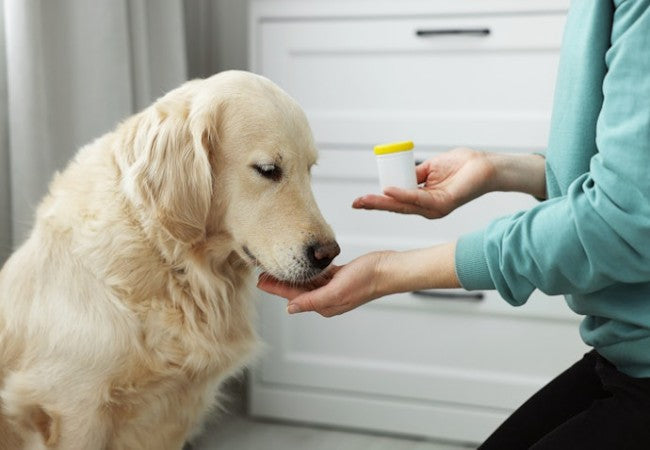Dog Supplements 101 2025: Vet Approved Benefits & Risks 🐾

In this article
Dog Supplements 101 2025: Vet Approved Benefits & Risks 🐾
By Dr. Duncan Houston BVSc
🔍 What Are Dog Supplements?
Dog supplements are products added to your pet’s regular diet designed to enhance health—like vitamins, minerals, fatty acids, joint support, and probiotics. Some boast “superfood” ingredients, but none are cure‑alls.
The safest products carry the NASC seal (National Animal Supplement Council), ensuring quality standards—look for it on labels.
✅ Why Your Vet Might Recommend Them
Supplements can support specific health goals or complement medicine, such as:
- Joint health (glucosamine + chondroitin) for aging or predisposed breeds
- Omega‑3 from fish oil for inflammation, skin, coat, and heart support
- Probiotics for gut health or antibiotic recovery
- Antioxidants like vitamins C/E or CoQ10 to combat aging and boost immunity
However, supplements aren’t substitutes for a balanced diet—excesses can be harmful.
📦 Common & Vet‑Backed Supplements
• 🦴 Glucosamine & Chondroitin
These joint supporters help maintain cartilage and slow arthritis. Benefits may take 8–12 weeks. Ideal for senior or large breeds.
• 🐟 Fish Oil (EPA & DHA)
Omega‑3 fatty acids reduce inflammation, promote coat shine, and support cognition. Choose sustainably sourced, third-party tested products.
• 🦠 Probiotics & Prebiotics
Beneficial during digestive upset or antibiotic use. Probiotics add “good” bacteria; prebiotics feed them. Results vary but are beneficial in some dogs.
• 🛡️ Antioxidants (C, E, CoQ10)
These protect cells from free radicals, support brain health, and may benefit heart conditions—but aren’t a reverse‑aging cure.
• 🔋 Multivitamins / Omegas / Greens
All-in-one products support overall wellness, coat, skin, and immunity—but may duplicate nutrients if your dog eats a complete diet.
⚠️ Risks of Over‑Supplementation
- Too much vitamin A/D can cause serious toxicity.
- Excess minerals (calcium, selenium) can disrupt growth or cause illness.
- Herbal or essential oil supplements may be unregulated or toxic.
🛠️ How Supplements Work in Your Dog
Many nutrients rely on gut flora and co-factors to be absorbed—so quality and diet matter. Dogs absorb fish oil, glucosamine, and probiotics in different ways—and their effectiveness depends on consistent daily use.
🔎 Choosing a Quality Supplement
- Look for the NASC seal for manufacturing standards.
- Check third-party testing (e.g., fish oil purity).
- Avoid human supplements; dog formulas account for canine metabolism and toxic substances like xylitol.
- Use the correct dosage by weight and follow the vet’s guidance.
📅 When to Start & How to Monitor
- Seniors & large breeds: joint support from ~6 years onwards.
- Skin or coat issues: try fish oil for 8–12 weeks, assess improvement.
- Digestive upset: use probiotics during/after antibiotics or stress.
- Re-evaluate needs annually—discontinue if no benefit or dietary sufficiency confirmed.
📋 Dr Houston’s Supplement Checklist
- ✔️ Identify a specific health support goal (joints, coat, digestion)
- ✔️ Choose vet-formulated dog supplement—look for NASC seal & testing
- ✔️ Introduce one supplement at a time & note any changes
- ✔️ Consult your vet—especially if your dog is on medication
- ✔️ Monitor for side effects, evaluate effectiveness after 8–12 weeks
- 📱 Ask A Vet is here for personalized supplement advice anytime
🌟 Final Thoughts
Dog supplements can offer valuable support—from joint comfort to skin, digestion, and aging—but they work best as part of a balanced diet and proper veterinary guidance. Always choose quality products and introduce them thoughtfully. With the right approach, you can safely boost your dog’s health and longevity. 🐾❤️
Need help picking a supplement, determining dosage, or evaluating benefit? Visit AskAVet.com or download the Ask A Vet app—your vet is just a tap away. 📱🐶






